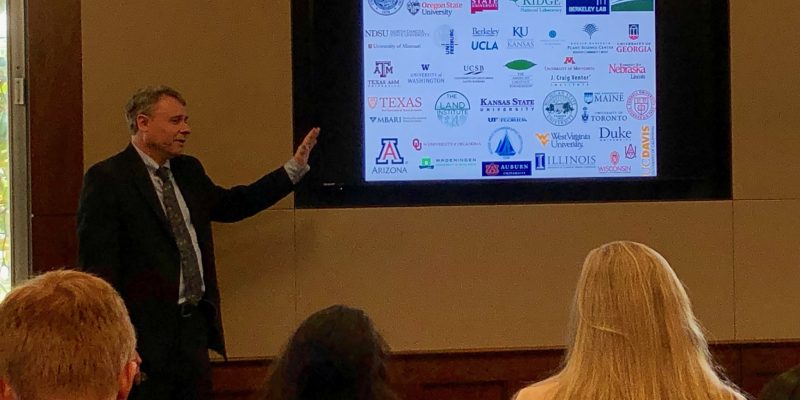Washington, DC – Leaders from the HudsonAlpha Institute for Biotechnology, a nonprofit research institute in Huntsville, Ala., presented, “Genomics in Agriculture 101: Exploring the Basics,” on Capitol Hill Thursday, June 13. This briefing was held at the Rayburn House Office Building. Members of Congress, their staff and House and Senate Committee staff members engaged with Jeremy Schmutz, faculty investigator and co-director of the HudsonAlpha Genome Sequencing Center; Kankshita Swaminathan, PhD, faculty investigator; and Neil Lamb, PhD, vice president for Educational Outreach, during the briefing.
The purpose for “Genomics in Agriculture 101” was to provide a forum for leaders in the field of plant genomics to interact with the leaders who drive national policy, impacting agriculture for the United States and beyond.
“Enormous progress has been made in plant genomics in just a few short years. We have gone from generating a single reference genome for a single plant, to generating hundreds of reference plant genomes and detailed diversity of crop collections,” said Schmutz. “These advances are providing solutions to the many agricultural challenges faced by the farming community every day. Genomics 101 provided decision makers on national policy an opportunity to learn more about the reach and impact of genomics in agriculture.”
Some of the topics discussed at the briefing involved the power and utility of the information gained through genomics, specifically regarding improvement of crop yields; acceleration of breeding cycles; resistance to diseases and pests; reaction and resulting changes based as a result of drought or floods. Additionally, the group from HudsonAlpha stressed the importance of collaboration within the field of plant genomics.
“HudsonAlpha collaborates with university-based scientists in every region of the country, commodity-based industry, farmers and groups that represent the farming community and multiple areas of the federal government. Ensuring an available food, fuel and fiber supply and developing more sustainable ways to do so is of utmost importance to all of us,” Schmutz added.
This is the third time HudsonAlpha has held a “Genomics 101” session for lawmakers and their staff.
“HudsonAlpha is committed to improving crop breeding and the practices within agriculture. HudsonAlpha’s work in plant genomics has immediate and lasting impact and it is our responsibility to ensure that our policy makers have the best information possible as they craft agricultural policy impacting people across the globe,” said Richard M. Myers, PhD, president and science director at HudsonAlpha. “We are grateful for this opportunity to serve in this way and create a more genomically-aware public.”
About HudsonAlpha: HudsonAlpha Institute for Biotechnology is a nonprofit institute dedicated to developing and applying scientific advances to health, agriculture, learning, and commercialization. Opened in 2008, HudsonAlpha’s vision is to leverage the synergy between discovery, education, medicine, and economic development in genomic sciences to improve the human condition around the globe. The HudsonAlpha biotechnology campus consists of 152 acres nestled within Cummings Research Park, the nation’s second largest research park. The state-of-the-art facilities co-locate nonprofit scientific researchers with entrepreneurs and educators. HudsonAlpha has become a national and international leader in genetics and genomics research and biotech education and fosters more than 40 diverse biotech companies on campus. To learn more about HudsonAlpha, visit hudsonalpha.org.
HudsonAlpha Media Contact:
Margetta Thomas
mthomas@hudsonalpha.org
256-327-0425


